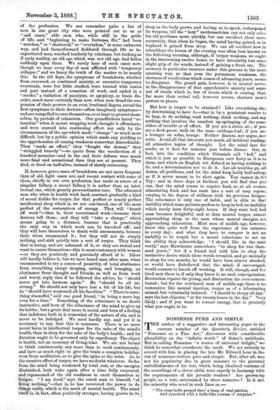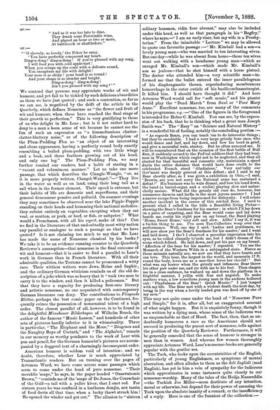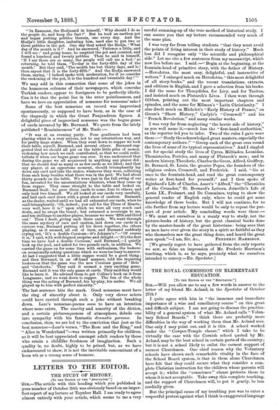NONSENSE PURE AND SIMPLE.
THE author of a suggestive and interesting paper in the current number of the Quarterly .Review, entitled. " Nonsense as a Fine Art," discourses with considerable plausibility on the "infinite worth" of Sense's antithesis. But in calling Nonsense "a source of universal delight," we think he somewhat overshoots the mark. We are entirely in accord with him in placing the late Mr. Edward Lear in the van of nonsense-writers pure and simple. But, after all, was not his popularity due in great measure to the pictorial embellishments of his text, which, being idealised versions of the scrawlings of a clever child, were exactly in harmony with the requirements of his juvenile readers P Are grown-up people, as a rule, entertained by sheer nonsense ? Is it not the minority who revel in such lines as :- " The soup-ladle peeped tiro' a heap of veal-patties, And squeaked with a ladle-like scream of surprise."
or:— " And as it was too late to dine, They drank some Periwinkle wine, And played an hour or two or more, At battlecock or shuttledore."
Or:•-•• " 0 shovely, so lovely,' the Poker he sang,
You have perfectly conquered my heart. Ding-a-dong ! ding-along ! If you're pleased with my song, I will feed you with cold apple-tart ! When you scrape up the coals with a delicate sound, You enrapture my life with delight ! Your nose is so shiny ! your head is so round ! And your shape is so slender and bright. Ding-a-dong ! ding-a-dong ! Ain't you pleased with my song ? "
We contend that persons may appreciate works of wit and humour, and yet fail to be tickled by such delicious absurdities as those we have just quoted ; and such a contention, so far as
we can see, is negatived by the drift of the article in the Quarterly, which defines Nonsense as " the flower and fruit of
wit and humour, when these have reached the final stage of their growth to perfection." This is very gratifying to those of us who delight in Mr. Lear ; but is it not rather hard to deny to a man a keen sense of wit because he cannot see the fun of such an expression as " a himmeltanious chatter- clatter-blattery noise," or of the following description of the Plum-Pudding Flea as " an object of an interesting and obese appearance, having a perfectly round body exactly resembling a boiled plum-pudding, with two little wings and a beak, and three feathers growing out of his head, and only one leg." The Plum-Pudding Flea, we may further remind our readers, had a habit of staring in a "vacant and voluminous manner." Let us take one more passage, that which describes the Clangle-Wangle, " or, as it is more properly written, Clangel-Wangel :"—" They live in the water as well as on land, using their long tail as a sail when in the former element. Their speed is extreme, but their habits of life are domestic and superfluous, and their general demeanour pensive and pellucid. On summer evenings they may sometimes be observed near the lake Pipple-Popple standing on their heads and humming their national melodies: they subsist entirely on vegetables, excepting when they eat
veal, or mutton, or pork, or beef, or fish, or saltpetre." What would a Frenchman, with all his esprit, make of this P Can we find in the literature of that undoubtedly most witty nation any parallel or analogue to such a passage as that we have quoted P Is it not claiming too much to say that Mr. Lear has made the name of Nonsense classical by his books ? We take it to be an evidence running counter to the Quarterly Reviewer's assumption—that nonsense is the final outcome of wit and humour—that it is easier to find a parallel to Lear's work in German than in French literature. With all their admirable qualities, the Teutons cannot be pronounced a witty race. Their wittiest writers were Jews, Heine and Saphir ;
and the ordinary German witticism reminds us of the old de- scription of a joke which was so heavy that it " took two men to carry it to the window, and then it killed a policeman." But that they have a capacity for producing first-rate literary
and artistic nonsense, no one acquainted with contemporary German literature can deny. The contributions to Fliegeade Blatter, perhaps the beat comic paper on the Continent, fre- quently evince the possession of nonsensical talent of a high order. The closest parallel of all, however, is to be found in the delightful Winchester Bilderbogen of Wilhelm Busch, the author of the famous " Music Lesson," and hundreds of other
sets of pictures hardly inferior to it in whimsicality. Three in particular, " The Elephant and the Moor," " Diogenes and the Naughty Boys of Corinth," and " The Alphabet," remain in our memory as worthy pendants to the work of Lear with pen and pencil, for the German humorist's pictures are accom- panied by a doggerel text of a charmingly inconsequent order.
American humour is seldom void of intention ; and we doubt, therefore, whether Lear is much appreciated by Transatlantic readers. But on turning over the pages of Artemus Ward, we have come across some passages which seem to come under the head of pure nonsense. " Their meraklis 'scape," he says, in the paper headed " Ossawatomie Brown," "reminds me of the 'scape of De Jones, the Coarschair of the Gulf—a tail with a yaller kiver, that I onct red. For sixteen years he was confined in a loathsum dunjin, not tastin of food durin all that time, when a lucky thawt struck him !
He opened the winder and got out." The allusion to " sixteen
solitary hossmen, ridin four abreast," may also be included under this head, as well as that paragraph in his " Bogfry," where he says,—" I am an early riser, but my wife is a Presby-
terian." From the inimitable " Lecture " we may be allowed to quote one favourite passage :—" Mr. Kimball had a son—a lovely young man—who was married to ten interesting wives.
But one day—while he was absent from home—these ten wives went out walking with a handsome young man—which so
enraged Mr. Kimball's son—which made Mr. Kimball's son so jealous—that he shot himself with a horse pistuel. The doctor who attended him—a very scientific man—in-
formed me that the bullet entered the inner parallelogram of his diaphragmatic thorax, superinducing membranous hemorrhage in the outer cuticle of his basiliconthamaturgist. It killed him. I should have thought it did." And here
Artemus Ward would call for " soft music," and his pianist would play the "Dead March" from Saul, or "Poor Mary Anne." Excellent nonsense, too, are many of the comments in his programme, e.g. :—"One of the figures in the foreground
is intended for Heber C. Kimball. You can see, by the expres- sion of his back, that he is thinking what a great man Joseph
Smith was." The " Easy " on " Science and Natural History" is a wonderful bit of fooling, notably the concluding portion:— "As regards Bears, you can teach 'em to do interestin things ; but they're onreliable. I had a very large grizzly bear once, who would dance and larf, and lay down, and bow his head in grief, and give a mournful wale, etsetry. But he often annoyed me. It will be remembered that on the occasion of the first battle of Bull Run, it suddenly occurd to the Fed'ral soldiers that they had busi- ness in Washington which ought not to be neglected, and they all started for that beautiful and romantic city, maintainin a speed durin the entire distance that would have done credit to the celebrated French steed Gladiateur,' Very nat'rally our Gov'ment was deeply grieved at this defeat ; and I said to my Bear shortly after, as I was givin a exhibition in Ohio,—I said, Brewin, are you not sorry the National arms has sustained a defeat ?' His business was to wale dismal, and bow his head down, the band (a barrel-organ and a wiolin) playing slow and melan- cholly moosic. What did the grizzly old cuss do, however, but commence darncin and larfin in the most joyous manner ? I had a narrer escape from being imprisoned for disloyalty. I will relate another incident in the career of this retchid Bear. I used to present what I called in the bills a Beautiful living Pictur- showing the Bear's fondness for his master : in which I'd lay down on a piece of carpeting, and the Bear would come and lay down beside me, restin his right paw on my breast, the Band playing Home, Sweet Home,' very soft and slow. Altho' I say it, it was a tuchin thing to see. I've seen Tax-Collectors weep over that performance. Well, one day I said, Ladies and gentlemen, we will now show yer the Bear's fondness for his master,' and I went and laid down. I tho't I observed a pecooliar expression into his eyes, as he rolled clumsily to'ards me, but I didn't dream of the scene which follerd. He laid down, and put his paw on my breast. Affection of the bear for his master,' I repeated. You see the Monarch of the Western Wilds in a subjugated state. Fierce as these animals natrally are, we now see that they have hearts and can love. This bear, the best in the world, and measurin 17 ft. round the body, loves me as a mer-ther loves her the-ild ! ' But what was my horror when the grizzly and infamous Bear threw his other paw under me, and riz with me to his feet. Then claspin me in a close embrace, he waltzed up and down the platform in a frightful manner, I yellin with fear and anguish. To make matters wuss, a low scurrilous young man in the audiens hollered out : Playfulness of the Bear 1 Quick Moosic !' I jest 'scaped with my life. The Bear met with a wiolent death the next day, by being in the way when a hevily loaded gun was fired off by one of my men."
This may not quite come under the head of. " Nonsense Pure
and Simple," for it is, after all, but an exaggerated account of what might happen. But it is exquisitely funny, though it was written by a dying man, whose sense of the ludicrous was as unquenchable as that of Hood. The fact, then, that so un- doubtedly humorous a race as the Americans shoal not succeed in producing the purest sort of nonsense, tells against
the position of the Quarterly Reviewer. Furthermore, it will be generally conceded that the sense of humour is stronger in men than in women. And whereas few women thoroughly appreciate Artemus Ward, Lear's nonsense-books are generally
popular with the gentler sex.
The Turk, who looks upon the eccentricities of the English,
particularly of young Englishmen, as symptoms of mental aberration, and often alludes to them as the deli Inglizli (mad English), has yet in him a vein of sympathy for the ludicrous which approximates in some instances quite closely to our nonsense-worship. Many of the tales of the Hodja Nassreddin
—the Turkish Joe Miller—seem destitute of any intention, moral or otherwise, but depend for their power of amusing the Turk upon the absolute inanity of a remark, or the insufficiency of a reply. Here is one of the funniest of the collection :—
" In Ramazan, the Hodjasaid in himself, Why should I do as the people do, and keep the fast ?' But he took an earthen pot and began putting pebbles therein, one every day. And the Hodja's little daughter, imitating him, used also to put two or three pebbles in the pot. One day they asked the Hodja, What day of the month is it ?' And he answered, 'Patience a little, and I will see ' and going home, he emptied the pot and counted, and found a hundred and twenty pebbles Then he said in himself, If I say there are so many, the people will call me a fool' so returning, he told them, To-day is the forty-fifth day of the month.' But they said, The month has but thirty days, and lo ! 'thou sayest that it is the forty-fifth !' And the Hodja answered them, saying, I indeed spoke with moderation, for if ye consider the reckoning of the pot, it is the hundred and twentieth day !"
We may add in this connection that some of the jokes in the humorous columns of their newspapers, which convulse Turkish readers, appear to foreigners to be perfectly idiotic. Can it be that the point lies in the utter pointlessness, and have we here an appreciation of nonsense for nonsense' sake P
Some of the best nonsense on record was improvised spontaneously, or supposed to have been, as in the case of the rhapsody in which the Great Panjandrum figures. A delightful piece of improvised nonsense was the bogus game 'of cards invented by Mr. Burnand. We quote from the lately published " Reminiscences " of Mr. Toole :—
"It was at an evening party. Four gentlemen had been playing whist in a very serious, not to say ostentatious way, and for pretty large stakes. When they went down to supper we took their table, myself, Burnand, and several others. Burnand sug- gested that we should all put on the table little piles of money, reckoning bow much we each contributed, so that we could redis-. tribute it when our bogus game was over. It was understood that during the game we all acquiesced in anything any player did : that we should deal as many or as few cards as we liked ; and that any player, at an opportune moment, should triumphantly lay down any card and take the stakes, whatever they were, collecting from each heap besides what there was in the pool. We had about thirty pounds on the table. We were just in the full swing of our fun, invented for the unostentatious whisters, when they came up from supper. They came straight to the table and looked on. Burnand dealt : he gave three cards to some, four to others, and -only took two himself. We all looked at our cards very carefully, .and laid each card down with a great show of caution. Burnand, as the dealer, waited until we had all exhausted our cards, when he said triumphantly, Oh, indeed ; you call for the Three of Hearts ; very well, here it is !' upon which we were all very much cast -down, and he swept the board ; but returned a sovereign to me, and ten shillings to another player, because we were fifth and third out.' Then I dealt, giving each three cards. We went through the same mystery of care and caution, laid down our cards in a -curious way, Burnand putting all his down together, the others playing, as it seemed, all out of turn, and Burnand suddenly .crying out, ' It's a double Corsican-it's Johnnie's Of course it is,' I said, with well-feigned surprise and delight.-' It's the first time we have had a double Corsican,' said Burnand.-I quietly took up the pool, and asked for two pounds each, in addition. We carried the game on for some time with enthusiasm, the lookers- .on occasionally asking questions which we were too busy to answer. At last I suggested that a little supper would be a good thing ; and then Burnand, in an off-hand manner, told the inquiring lookers-on that the game was the new Corsican game of Bolo' and Catchorka.' They said it seemed a very exciting game. Burnand said it was the only game at cards. They said they would like to learn it. He advised them to get Collins's book on it from Longman; and we went down to supper. The fun of the whole thing was the acting of Burnand, his by-play, his asides. We all played up to him with perfect sincerity."
'The last sentence hits the mark. Good nonsense must have the ring of sincerity about it. Only very clever actors could have carried through such a joke without breaking down. Lear's nonsense-poems seem to have an intention where none exists. The suavity and sonority of the diction, and a certain picturesqueness of atmosphere, delude one into sympathy with his fantastic dramatis persona. In conclusion, then, we are led to the conviction that just as the best nonsense—Lear's verses, " The Rose and the Ring," and '-‘‘ Alice in Wonderland "—was written primarily for children, -so it will be best appreciated amongst adult readers by those who retain a childlike freshness of imagination. Such a quality is, no doubt, highly to be prized, but, as we have endeavoured to show, it is not the inevitable concomitant of a "keen wit or a strong sense of humour.




















































 Previous page
Previous page